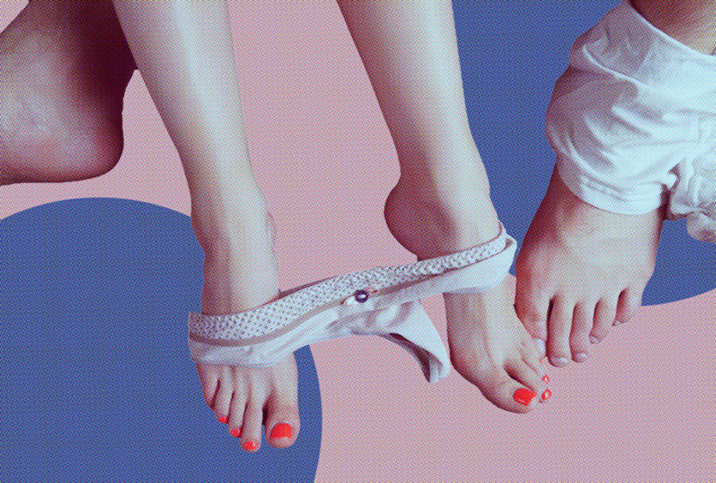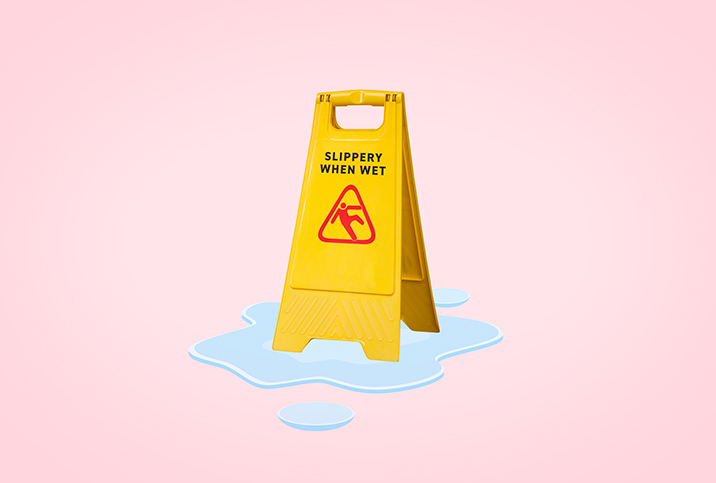Why You Feel Sore (Down There) After Sex

Sex shouldn't be painful (unless by design), but it's not totally out of the norm to wake up the morning after feeling a little sore or even walking funny. Maybe you like that kind of reminder of a night well spent, but if you're wondering WTF is up with your achy lady parts after the oxytocin has worn off, these issues could be to blame.
You weren't wet enough
Arousal activates the nervous system, which kick-starts the natural lubrication process by increasing the blood flow to the genitals. "That causes fluid to ooze onto the vaginal mucosa from the underlying blood vessels," said Jean Marino, a women's health nurse practitioner at University Hospitals Cleveland Medical Center. This process is meant to protect the vagina from friction during penetration. Generally, the more turned on you are, the wetter you get.
But even if you're super-turned-on, that doesn't guarantee a WAP (decreased lubrication can be linked to menopause, perimenopause, birth control pills, certain medical conditions and medications, anxiety, depression and even just stress, Marino said). If that's the case and you still have penetrative sex, "friction can cause small tears in the vaginal tissue called fissures," Marino said. Like tiny paper cuts, you would definitely feel these tears the next day, but that discomfort should disappear after a day or two (and lube can help in the future).
Your partner was bigger than you're used to
Just like penises come in all different sizes, so do vaginas. "The average length of a vagina is about 4 inches," Marino explained. Quick sex ed refresher: The vagina is the muscular canal that extends from the vulva (the outer part of the female genitalia) to the neck of the uterus (which is located in the lower abdomen).
Similar to how a penis grows in size when it's erect, the vagina is elastic.
"When the vagina is at 'rest,' meaning there's no penetration and it's not pushing out a baby, its walls collapse against each other,” Marino explained. "These walls have folds, called rugae, that can stretch to accommodate various penis lengths and widths."
If your new partner is pretty girthy or you're using a larger toy than normal, your vaginal tissue may need more time to stretch to accommodate that size, Marino said—hey, a little extra foreplay never hurt anyone.
Things were quicker or rougher than normal
There's nothing wrong with a quickie or rough sex, but "there needs to be time for appropriate arousal and lubrication," Marino said. "Women need to be turned on mentally to activate the nervous system, so it can then increase blood flow and produce lubrication in the genitals."
Any next-day soreness after a quickie is most likely due to too much friction and not enough lubrication, a recipe for microtears in the vagina. In that case, a handy bottle of lube is your best friend. But experimenting with rougher sex or more intense positions can put extra pressure on your vagina or vulva (and other muscles, for that matter), which might also leave you feeling achy a day later. Like post-workout soreness, it should wear off soon enough.
You might have a condom allergy
If you're feeling sore, swollen and irritated below the belt, think back: Did you use a condom the last time you had sex? What was that condom made of? Latex (which comes from the rubber tree, hence, the nickname rubbers) is the most common condom material—and a well-known allergen. "An allergic reaction causes skin and tissue inflammation, which then leads to irritation," Marino said. In this case, that irritation occurs in the vagina.
Allergies could be at play if you don't have any other issues with arousal or lubrication, Marino said. If that's the case, "make an appointment with a dermatologist, who can do skin patch testing and check for allergies," she advised. In the meantime, all you have to do in the future is avoid latex condoms—which is no big deal, since condoms now come in all kinds of materials, including polyisoprene (a synthetic rubber), polyurethane (a type of plastic) and even lambskin.
You could have an infection
Pelvic pain is one of the most common symptoms of a urinary tract infection (UTI), a condition most frequently associated with sex; 1 in 5 women will experience a UTI in their lifetime, according to the National Kidney Foundation.
"With a UTI, women will often have pain in their bladder, which is located above the vagina and may be 'bumped' during intercourse and cause discomfort," Marino said.
Other infections that can cause soreness include yeast infections, bacterial vaginosis and some sexually transmitted infections (STIs). If you suspect any of those, make an appointment with your OB-GYN right away.
In general, the occasional twinge or ache after a night between the sheets is nothing to worry about. But if you're left waddling for a couple of weeks every time you have sex or the pain lingers after one encounter, you should always seek help from a healthcare provider who can address the issue. As Marino said, "No woman should tolerate pain with sex."


















